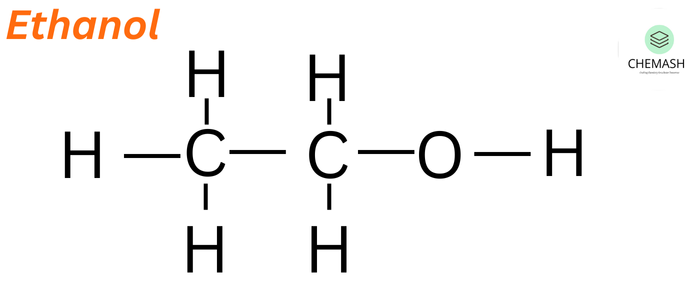Chemical Reactions of Alcohols – Types, Mechanisms & Examples
Updated on: August 2025 • Author: CHEMASH Team
Introduction
Alcohols are organic compounds containing one or more hydroxyl (–OH) groups attached to a saturated carbon atom. Their chemical reactivity is primarily influenced by the hydroxyl group and the carbon skeleton.
1. Oxidation of Alcohols
Oxidation involves the conversion of alcohols to aldehydes, ketones, or carboxylic acids depending on the type of alcohol:
- Primary alcohols → Aldehydes → Carboxylic acids
- Secondary alcohols → Ketones
- Tertiary alcohols → Resistant to oxidation (under mild conditions)
Example: Ethanol → Ethanal → Ethanoic acid
2. Dehydration of Alcohols
Dehydration is the removal of a water molecule from alcohols to form alkenes. This is usually carried out using concentrated H2SO4 or Al2O3 at high temperatures.
Example: Ethanol → Ethene + H2O

3. Esterification
Alcohols react with carboxylic acids in the presence of concentrated sulfuric acid to form esters. This reaction is reversible.
Example: Ethanol + Acetic acid → Ethyl acetate + Water
4. Substitution Reactions
Alcohols can undergo nucleophilic substitution where the hydroxyl group is replaced by another group, often via the formation of an alkyl halide.
Example: ROH + HX → RX + H2O
5. Reaction with Sodium
Alcohols react with sodium metal to produce alkoxides and hydrogen gas.
Example: 2C2H5OH + 2Na → 2C2H5ONa + H2↑
MCQ Quiz – Chemical Reactions of Alcohols
- Primary alcohol on oxidation gives:
- a) Ketone
- b) Aldehyde ✅
- c) Ester
- d) Ether
- Dehydration of alcohol forms:
- a) Alkene ✅
- b) Alkane
- c) Aldehyde
- d) Carboxylic acid
- Esterification is catalyzed by:
- a) NaOH
- b) Conc. H2SO4 ✅
- c) NaCl
- d) KMnO4
True/False Questions
- All alcohols can be oxidized to aldehydes. ❌ False – Secondary alcohols give ketones.
- Tertiary alcohols resist oxidation under mild conditions. ✅ True
Conclusion
The chemical reactions of alcohols form the foundation for many industrial and laboratory syntheses. From oxidation to esterification, each reaction pathway has significant applications in pharmaceuticals, perfumes, fuel additives, and more.

Pingback: classification-of-alcohol
Pingback: interconversion-of-alcohols-phenols-and-ethers
Pingback: introduction-to-aldehydes-and-ketones
Pingback: classification-of-ethers